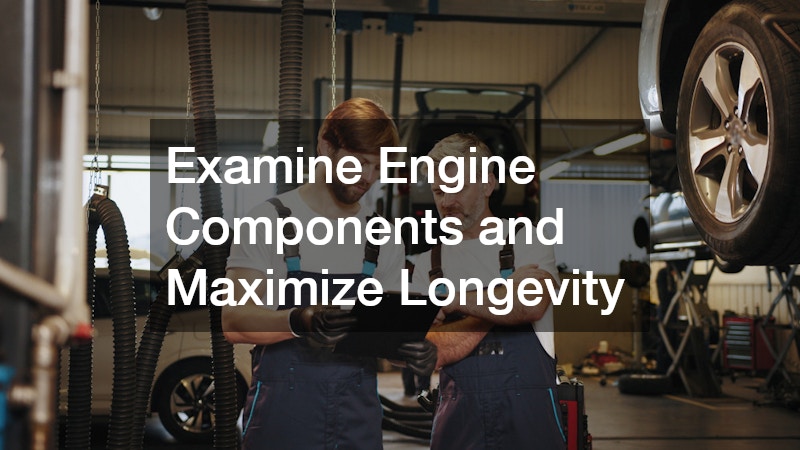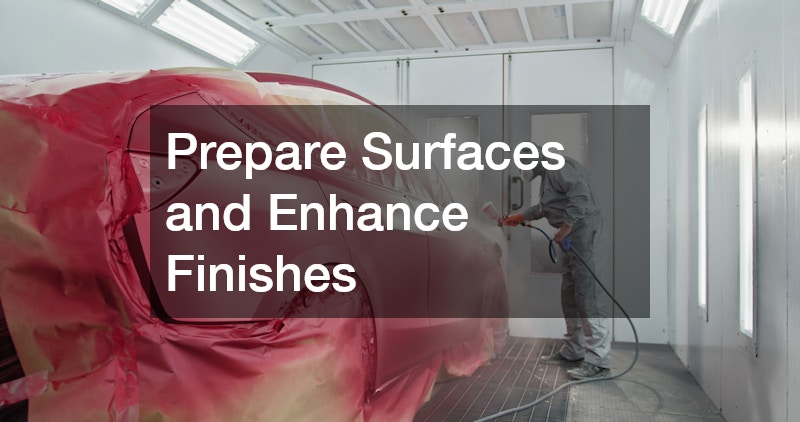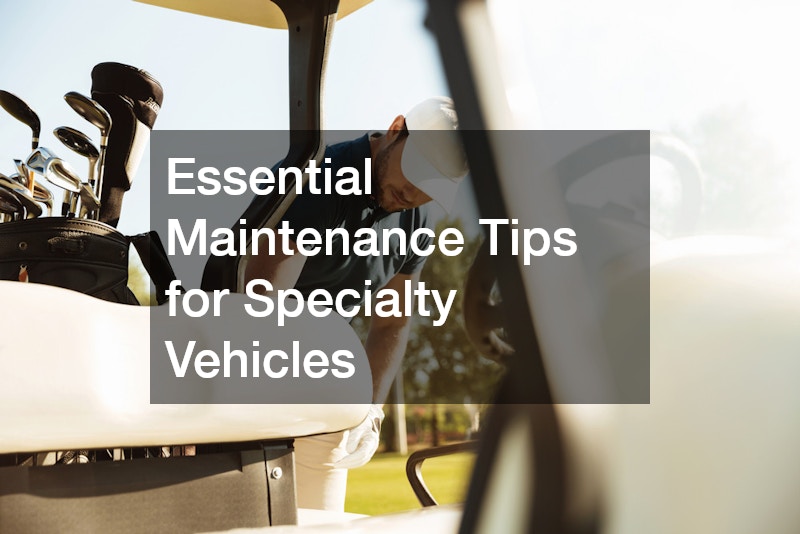
Maintaining specialty vehicles requires more than basic care—it demands a detailed understanding of their unique systems, components, and operational needs. From recreational motorcycles and golf carts to large RVs and custom trucks, these vehicles are designed for specific functions and environments, which means their upkeep is unlike that of standard cars. Proper care ensures safety, reliability, and long-term performance, while neglect can lead to costly repairs, reduced lifespan, or even safety hazards.
Owners of specialty vehicles face challenges that go beyond routine inspections. These vehicles often operate under conditions that place higher stress on mechanical, electrical, and structural systems. They may encounter rough terrain, extended travel distances, or extreme weather, all of which can accelerate wear if not properly addressed. Developing a consistent maintenance routine, understanding the nuances of each system, and addressing minor issues promptly can prevent larger problems from occurring.
Regular attention to maintenance also improves safety for everyone using the vehicle. Components such as brakes, steering, and suspension can wear down over time, and small issues can quickly escalate into dangerous situations if not properly monitored. Routine inspections allow owners of specialty vehicles to identify and address these risks before they become serious, giving them confidence in the vehicle’s performance. Taking the time to maintain every system contributes not only to longevity but also to a smoother, more reliable experience each time the vehicle is in use.
Examine Engine Components and Maximize Longevity

Understanding the inner workings of a specialty vehicle’s engine is essential for optimal performance and longevity. Diesel engines, common in many large specialty vehicles, are known for their durability and high torque output, but they require specific care to function effectively over time. Components such as injectors, fuel filters, and timing systems must be regularly inspected to detect early signs of wear or malfunction. Even minor neglect can lead to significant engine damage, decreased fuel efficiency, and expensive repairs. Taking a proactive approach to engine maintenance ensures that these vehicles remain reliable and capable under demanding conditions.
Specifically, diesel parts require regular cleaning, lubrication, and replacement according to manufacturer guidelines. Monitoring fuel quality, performing injector maintenance, and ensuring fluid levels remain stable are critical practices. Environmental factors like dust, high temperatures, and heavy loads can also accelerate wear, making vigilance essential. Additionally, owners should monitor engine performance indicators such as unusual noises, smoke, or vibrations, as these often signal issues before they become severe. By following a thorough maintenance schedule, owners of specialty vehicles can maintain consistent power delivery, reduce the likelihood of breakdowns, and extend operational life. Diesel engines that are properly cared for not only perform better but also provide confidence during long trips, heavy hauling, or off-road adventures.
Maintain Batteries and Ensure Reliable Power
Batteries are the lifeblood of many vehicles, supporting everything from ignition systems to lighting and electronic components. Proper battery maintenance prevents unexpected failures and extends service life, ensuring the vehicle is always ready when needed. Many models include advanced electronics, GPS systems, and auxiliary equipment that place additional demands on battery performance. Keeping terminals clean, monitoring charge levels, and replacing worn batteries on schedule are essential practices to avoid inconvenient breakdowns. Regularly inspecting batteries for corrosion, swelling, or leaks can also help prevent safety hazards while ensuring the vehicle remains operational under demanding conditions.
For golf cart battery replacement, specific care is required due to the deep-cycle batteries used in these vehicles. Ensuring that each battery is correctly charged, terminals remain corrosion-free, and water levels are adequate can prevent sudden power loss and prolong battery life. Replacing batteries at the right time with compatible models also protects other electrical components and ensures smooth, uninterrupted operation. Regular attention to battery health supports longevity while maintaining safety and reliability, allowing owners to confidently use their vehicles without interruption, whether for leisure, work, or transportation. Proper battery care also reduces the risk of damaging connected systems, extending the overall lifespan of electrical components.
Prepare Surfaces and Enhance Finishes

The exterior surfaces of specialty vehicles are constantly exposed to environmental stressors, making proper surface preparation essential for long-lasting finishes. Sandblasting is an effective method for removing old paint, rust, and other contaminants, providing a clean, even surface for coatings or protective treatments. Proper preparation ensures that paints, powders, or sealants adhere evenly, resist damage, and maintain a high-quality appearance over time. Custom designs or unique materials often require precise handling during surface preparation to prevent accidental damage to delicate components.
Sandblasting involves selecting the appropriate media, pressure, and technique for the material being treated. Metal, fiberglass, and composite surfaces all require different approaches to avoid pitting or warping. Skilled sandblasting can reveal hidden imperfections, such as small corrosion spots or dents, which can then be repaired before finishing. Additionally, preparing surfaces thoroughly before painting or coating can reduce future maintenance needs, as properly bonded coatings resist peeling, fading, and corrosion. This process not only improves durability but also preserves structural integrity. By investing time in proper surface preparation, owners ensure that protective finishes adhere well, maintain aesthetic appeal, and stand up to the rigors of regular use and environmental exposure.
Repair Body Panels and Restore Appearance
Cosmetic damage, even minor dents or dings, can compromise the function and appearance of vehicles. Dent repair is essential for restoring both structural integrity and visual appeal. Unrepaired damage can impact aerodynamics, affect the adherence of protective coatings, and even allow moisture to seep in, causing corrosion. Regular inspection and timely repair of body panels help maintain both the value and functionality of the vehicle. Additionally, addressing damage promptly can prevent the problem from spreading, which is particularly important for models used in recreational or commercial settings.
Dent repair techniques vary depending on material and severity of damage. Paintless dent removal works well for minor deformations without affecting the surrounding paint, while traditional body filler methods may be necessary for larger or more complex dents. Vehicles with irregular panels or custom materials often require specialized tools and techniques to avoid further harm. Incorporating regular inspections into a maintenance routine ensures that small issues are caught early, saving money and reducing downtime. By addressing cosmetic damage promptly, owners preserve both appearance and performance, ensuring their specialty vehicles continue to function properly and maintain a professional, well-cared-for look that enhances resale value and overall longevity.
Obtain Licenses and Achieve Certification

Many larger or commercial models require specific licensing or certification for safe and legal operation. Completing a CDL class equips drivers with knowledge of vehicle control, weight distribution, load management, and safety regulations. Licensing and certification are not simply bureaucratic requirements—they are critical for preventing accidents, protecting others on the road, and ensuring the longevity of heavier vehicles under demanding use.
A CDL class provides hands-on instruction as well as theoretical knowledge about vehicle inspection, emergency procedures, and operational best practices. Drivers learn how to handle unique characteristics, including braking, turning, and maintaining stability under heavy loads. Beyond safety, certification encourages owners to better understand vehicle systems, which supports routine maintenance and long-term care. Obtaining proper certification enhances driver confidence and contributes to safety, efficiency, and lifespan. Certified operators are better prepared to avoid mishaps, follow regulations, and keep their vehicles in peak condition, creating a safer and more dependable experience for both operator and vehicle.
Protect Exteriors and Apply Finishes
Maintaining the exterior of specialty vehicles is vital for both appearance and structural protection. Powder coating service provides a durable, protective layer for metal components, preventing corrosion, scratches, and weathering. This process is especially beneficial for models exposed to the elements or heavy usage, ensuring that metal parts remain functional, attractive, and resistant to damage over time. Properly protected surfaces also reduce the frequency of maintenance and help preserve long-term value.
Powder coating involves meticulous preparation, careful application of the coating, and curing under controlled conditions. Vehicles with small, intricate components require precision during the process. Selecting the right coating color, thickness, and finish enhances corrosion resistance while maintaining aesthetic appeal. Powder coating can also reduce the need for frequent touch-ups and repainting, particularly useful for vehicles frequently exposed to harsh environments. Investing in powder coating service supports durability and appearance, allowing owners to reduce ongoing maintenance needs and enjoy their specialty vehicles with confidence.
Handle Heavy Loads and Manage Emergencies

Large models such as RVs, trucks, and commercial rigs may encounter situations that require professional assistance during breakdowns or accidents. Heavy duty towing ensures that vehicles are moved safely and efficiently without causing additional damage. Unlike standard towing, heavy duty equipment is designed to handle the size, weight, and structural complexities of these vehicles, minimizing risk and reducing downtime.
Heavy duty towing involves reinforced flatbeds, cranes, and specialized winches, along with operators trained to secure oversized loads. Proper techniques account for weight distribution, shifting cargo, and road conditions to prevent accidents during transport. Vehicles transported incorrectly risk further damage, higher repair costs, and increased downtime. Heavy duty towing services also provide rapid response options in emergency scenarios, ensuring that vehicles are quickly removed from unsafe conditions. Access to professional towing services allows owners to manage emergencies effectively, protecting both their investment and the safety of everyone involved.
Perform Motorcycle Maintenance and Ensure Safety
Motorcycles and other two-wheel vehicles require meticulous maintenance to remain safe and functional. Routine inspections of tires, brakes, chains, and fluid levels are essential to prevent accidents and mechanical failures. Motorcycles face unique stresses from higher speeds, sharp maneuvers, and variable terrain, making consistent care even more critical. Neglecting maintenance can compromise safety and reduce performance, particularly in vehicles designed for recreation or off-road use.
Motorcycle service involves detailed assessments of suspension systems, electrical components, and engine performance, along with timely replacements of worn or damaged parts. Proper lubrication of moving components and careful monitoring of tire wear further ensure a smooth and safe ride. Consistent maintenance keeps motorcycles responsive, safe, and enjoyable to ride while reducing the likelihood of costly repairs. Dedicating time to routine service ensures reliability and enhances the overall experience. Well-maintained motorcycles not only perform better but also retain value and provide peace of mind during every ride.
Inspect Roofs and Prevent Leaks
For larger vehicles like RVs, roof maintenance is critical for protecting the interior and structural integrity. RV roof repair prevents water intrusion, mold growth, and deterioration of insulation or support structures. Roofs often include vents, solar panels, or HVAC units that require careful inspection and repair. Maintaining the roof extends the vehicle’s lifespan and ensures continued functionality.
RV roof repair includes thorough cleaning, detailed inspections for cracks or leaks, and application of sealants or coatings where needed. Monitoring flashing, joints, and attachment points ensures they remain watertight and secure. Minor repairs, if delayed, can lead to significant damage, including structural weakening or interior water damage. Vehicles with well-maintained roofs are more reliable, safer, and easier to enjoy, allowing owners to confidently travel, camp, or work without worrying about costly roof-related repairs. Proactive roof maintenance also supports energy efficiency by preventing drafts or heat loss.
Maintaining specialty vehicles is a complex but rewarding process that combines mechanical knowledge, preventative care, and attention to detail. From engine components and batteries to body panels, finishes, and roofs, every system requires consistent attention to remain functional, safe, and visually appealing. Proactive inspections, timely repairs, and professional services help prevent breakdowns, extend the vehicle’s lifespan, and preserve its value. Owners who approach maintenance with care gain both peace of mind and reliable performance.
Comprehensive care ensures that specialty vehicles continue to perform safely and efficiently across all uses. Engine management, battery upkeep, surface preparation, cosmetic repairs, licensing, protective coatings, and emergency readiness all contribute to maintaining peak condition. By committing to routine maintenance and addressing problems promptly, owners protect their investments, enhance reliability, and enjoy the full potential of their vehicles for years to come. Consistent care transforms vehicles from mere transportation tools into dependable and long-lasting assets, capable of delivering performance, safety, and enjoyment in every journey. Regularly updating maintenance practices based on technological advances and manufacturer recommendations further ensures continued reliability under any condition. By prioritizing maintenance, owners not only preserve functionality but also extend the overall lifespan and value of their specialty vehicles, making them a worthwhile long-term investment.



